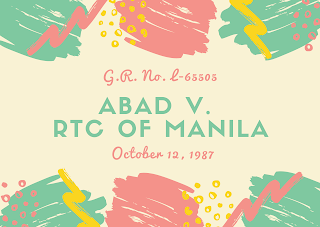G.R. No. L-65505 October 12, 1987GABRIEL ABAD, PIO AGANON, MARIO ALARCIO, JOSE AQUINO, CESAR
AURELIO, SOTERO BERNARDO, AURELIO CABRAL, JESUS CARREON, ABELARDO CARILLO, ET
AL., petitioners, vs. REGIONAL TRIAL COURT OF MANILA, BRANCH LII-HON. DAVID G. NITAFAN
and THE PHILIPPINE AMERICAN GENERAL INSURANCE COMPANY, INC., respondents.
FACTS:
The instant petition for certiorari originated from a
complaint by the petitioners filed on August 18, 1978 against respondent
PHILAMGEN for the enforcement of contract and recovery of loss of money
basically praying for, among other things, payment of the money value of the
respective accumulated sick leave with pay of the separated employees of
respondent company either thru retirement, retrenchment or resignation.
Instead of filing an answer thereto, PHILAMGEN moved to
dismiss the complaint, which the trial court granted.
After a denial of their motion to reconsider to the
aforesaid order, petitioners filed before the SC a petition for Certiorari. The
SC ordered for the case to be remanded to the trial court for further
proceedings.
Unfortunately, fire destroyed the sala wherein the entire
records of Civil case No. 117708 were kept. However, the records of the case
were reconstituted on January 21, 1982 and the case was renumbered as Civil
Case No. 82-1324. Thereafter, respondent Philamgen filed its Answer to the
complaint. On January, 1983, judicial reorganization took place by the passage
of Executive Order No. 864 and the case at bar was re-raffled to respondent
Regional Trial Court of Manila, which was presided over by Judge David G.
Nitafan. Respondent court motu proprio, dismissed the complaint in Civil Case
No. 82-1324. declaring that it lacked jurisdiction over the subject made being
money claims arising from employer-employee relations. Motion for
reconsideration filed by petitioners was denied by respondent judge. Hence,
this petition.
ISSUE:
Whether or not the trial court has jurisdiction over the
case
RULING:
One of the important features in the Judiciary
Reorganization effected through B.P. 129 is the addition of paragraph (6), Sec.
19, in defining the jurisdiction of Regional Trial Courts (which took the place
of the abolished Courts of First Instance), which reading as follows:
In all cases not within the exclusive jurisdiction of any
court, tribunal, person or body exercising judicial or quasi-judicial
functions.
A provision not found in Sec. 44 of the Judiciary Act of
1948. It was the intention of the legislative body to uncluttered the courts of
cases which may be adjudicated, in the first instance, by officials or bodies
exercising quasi-judicial adjudicatory powers like the Labor Arbiters or the
National Labor Relations Commission a specialized body or bodies on labor related
provisions and are not restricted by the technical rules of pleading and
evidence.
The Regional Trial Courts of today are actually the same
courts that functioned as Courts of First Instance before the Judiciary
Reorganization Act (Batas Pambansa Bilang 129). There might have been a change
in the name and in some incidental features but essentially, they are the same.
However, whereas before jurisdiction over money claims of
laborers and employees appertained to Courts of First Instance, the same are now
to be taken cognizance of by proper entities in the Department of Labor and
Employment.
The rule of adherence of jurisdiction until a cause is
finally resolved or adjudicated does not apply when the change in jurisdiction
is curative in character. Thus in the instant case, there is nothing wrong in
holding that Courts of First Instance /Regional Trial Courts no longer have
jurisdiction over aforesaid monetary claims of labor.


Comments
Post a Comment